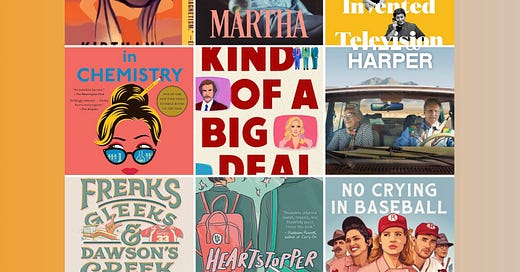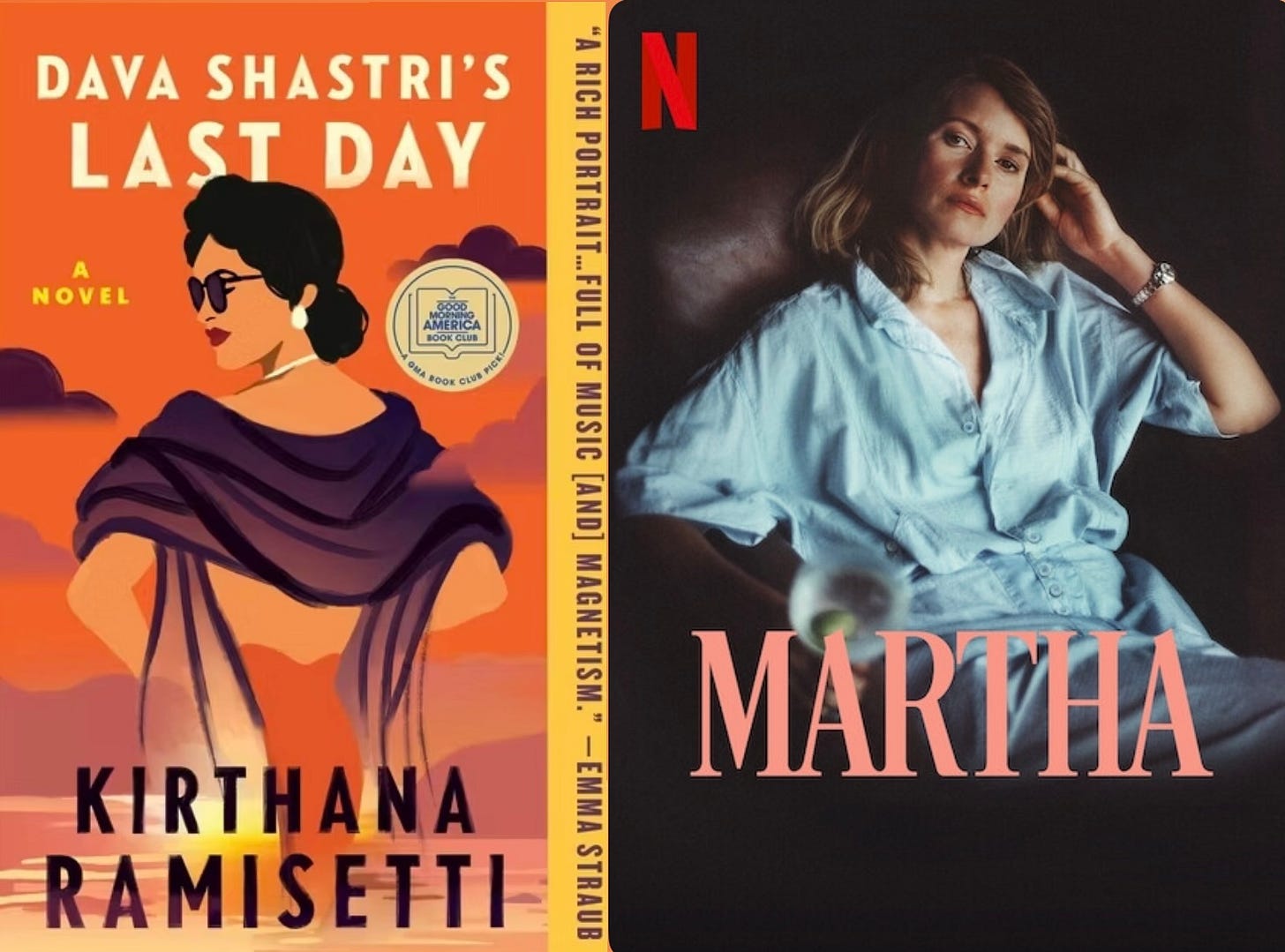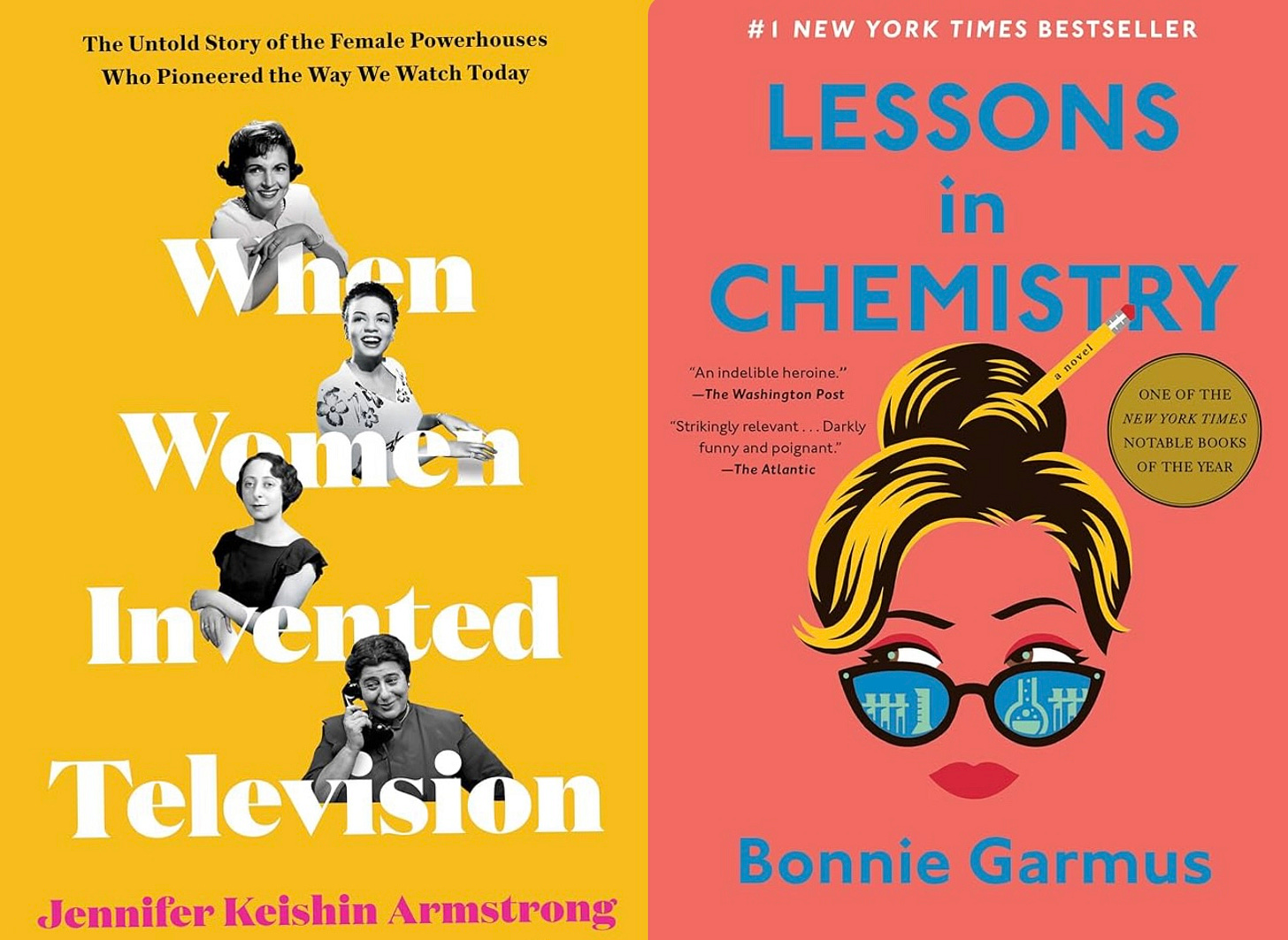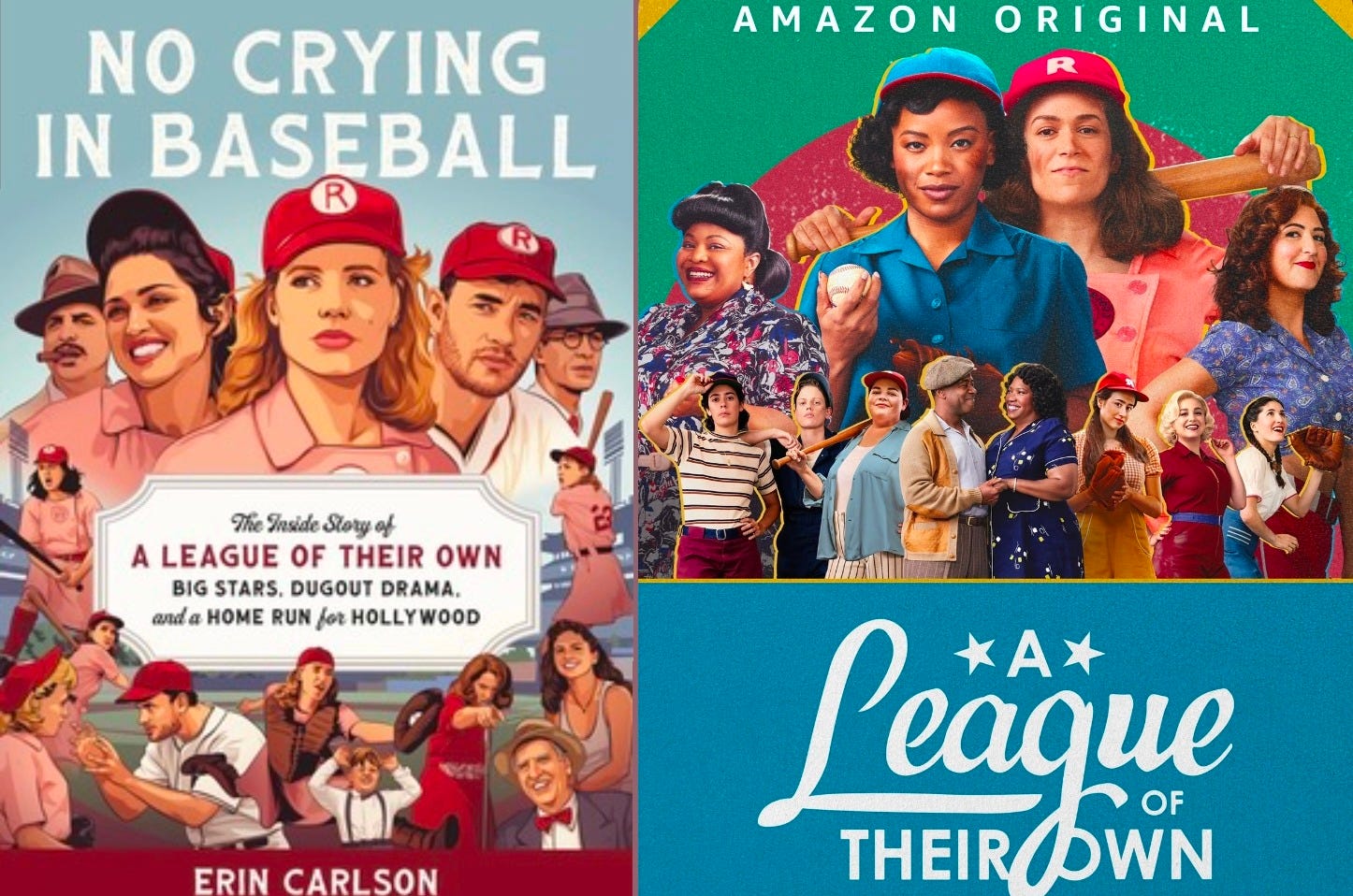Pop Culture Secret Santa
Our handpicked book pairings go together as well as milk and cookies. 🥛🍪
Tis the season for holiday gift guides! Our version has a bit of a twist: We’re each recommending one of our books to be enjoyed with another piece of pop culture. These pair together as well as milk and cookies, or Ariana Grane and Cynthia Erivo in Wicked.
From eye-opening documentaries to bestselling novels, here’s what we’re gift wrapping for you this season.
Dava Shastri’s Last Day by Kirthana Ramisetti ↔️ Martha
A few minutes into watching the new Martha Stewart documentary I was struck by the similarities between this multimillionaire businesswoman and my fictional one, Dava Shastri. They are equally fearless, wildly ambitious—and crucially, they do not worry about being perceived as unlikeable.
Both women are successful because of their single-minded dedication to their profession, and they have no qualms about how often their careers take precedence over their families. Inspired by their similarities, I created this side-by-side comparison on Instagram1 to demonstrate their resemblance. (They could have totally been friends and confidantes!)
Another thing the two women have in common? After several decades of devoting themselves to their eponymous organizations, Dava and Martha seek to take charge of their legacies. Diagnosed with a terminal illness, Dava takes the extreme tactic of announcing her death early so she could read her obituaries and learn how the world perceives her. (Needless to say, this backfires on her.)
Martha goes the much more sensible route of authorizing a documentary about herself, even though she is not happy with how it turned out. But the moments she likes the least are what makes Martha so fascinating, giving us a glimpse of the flawed, complicated woman behind the facade of steely perfection.
When Women Invented Television by Jennifer Keishin Armstrong ↔️ Lessons in Chemistry by Bonnie Garmus
I love that The New York Times recently paired my labor of love, When Women Invented Television, with Emily Nussbaum’s Cue the Sun! on its list of Notable Books of 2024, an event that partially inspired this list. (This is my not-particularly-humble brag.) But I think my book, which chronicles the history of four undersung female pioneers from TV’s beginnings, has a lot in common with another popular work: Bonnie Garmus’s masterpiece Lessons in Chemistry.
If you missed it, Lessons in Chemistry tells the story of Elizabeth Zott, a no-nonsense, brilliant chemist in the 1960s who’s forced out of the lab by vicious sexism and instead becomes the unlikely star of a local TV station’s cooking show. She’s good at the “women’s work” of cooking because it is chemistry, and she’s popular with women, it turns out, mainly because she takes them seriously. It’s funny, tragic, and uplifting at turns, and a tour-de-force. Her story also echoes a lot of what I found out about the early history of women in TV.
My women—sitcom star/creator/producer/writer Gertrude Berg, inventor of the soap opera Irna Phillips, civil rights activist and trailblazing show host Hazel Scott, and Betty White in her early days as a TV personality and producer—all dealt with sexism, and its pressures to conform, differently. (Berg, for instance, leaned into her “motherly” image, while White swore off marriage to focus on her career.) Many women of the time also made their way by emphasizing “female” attributes and activities, like cooking, housekeeping, and being a pleasant hostess, even while they were often ruthless businesspeople behind the scenes.
As a side note, when I was writing When Women Invented Television, I also took some inspiration from Taylor Swift’s tale of Rebekah Harkness as told in “The Last Great American Dynasty,” a wonder of tight nonfiction storytelling and an ode to an unruly woman.
Kind of a Big Deal by Saul Austerlitz ↔️ Will & Harper
Writing about pop culture can sometimes entail the collision of hard reporting with absurdist subject matter. It can also lead to bigger, more complex, more human stories that you never could have glimpsed at the outset of your project.
At one point in the research process for my most recent book Kind of a Big Deal, about the movie Anchorman, I wanted to find out who wrote the film tie-in book Let Me Off at the Top, in which Ron Burgundy studies jazz with Chet Baker, attends Our Lady Queen of Chewbacca High School, overseen by Monsignor Morty Grossman, and runs a cockfighting ring with Vice President Walter Mondale.
The book was credited to Ron Burgundy, but after some intensive sleuthing and a tip-off from an anonymous source in a darkened parking garage, I determined that Ron was a fictional character. I asked some of my sources if they knew who had served as Ron’s ghostwriter, and received a two-word answer: “Harper Steele.”
The problem was that “Harper Steele” did not appear to have an IMDB page or much in the way of an internet presence. I guessed that Harper Steele was likely the same person I had spoken to early in my research, a former SNL writer and close friend of Will Ferrell’s who had collaborated with the star on films like the ludicrous Spanish-language effort Casa de Mi Padre, but for the sake of veracity, and of not embarrassing myself or anyone else, I reached out to Steele to confirm that it was her. It was a nerve-wracking email to send, and Steele was nothing but gracious about it.
I could glimpse the outline of a fascinating story that wasn’t mine to tell, beyond making sure that I got Steele’s name right in my manuscript. Will & Harper, directed by Josh Greenbaum, and featuring the two old friends and SNL alums re-bonding over a cross-country road trip, is the remainder of that story. It is moving and heart-wrenching and funny in equal parts, containing both Steele’s pain over having to deny her gender identity and Ferrell’s hankering for Dunkin’ donuts.
It is, for me, the ideal movie to show to someone willing to learn more about what it means to be trans, giving Steele the opportunity to tell her story, with Ferrell as our non-judgmental guide and interlocutor.
Will & Harper is a reminder of three eternal truths: Curiosity is a virtue; it is good to support the people we care about unconditionally; and true, meaningful, vulnerable friendship is the most precious of commodities.
Freaks, Gleeks and Dawson's Creek by Thea Glassman ↔️ Heartstopper by Alice Oseman
Part of the joy of getting to write a book about teen television was revisiting the angst, pain and thrill of being a teenager, when every moment felt so big and so important. As a writer, it was a gratifying experience to slip away into Capeside, Newport, Dillon and so many other beloved fictional worlds, while talking to the writers, directors, crew and cast members who brought those places to life. It was also a stark reminder that incredible teen dramas, which dominated the airwaves in the ‘90s and early aughts, just aren’t made anymore. That's why Heartstopper by Alice Oseman is such a special, nostalgic book.
Released in 2016, the graphic novel chronicles the love story between two boys — Charlie and Nick — and is so unapologetically sweet, delivering those warm, fuzzy feelings of hands brushing for the first time and the intoxicating sparkles of young romance. I'll admit I've never been a cartoon person so I was a little skeptical going in, but absolutely churned through this beautifully done book. It will make you feel good, hopeful, safe and romantic in a very chaotic world — which is exactly what our favorite teen shows did for us growing up.
No Crying in Baseball by Erin Carlson ↔️ Abbi Jacobson’s A League of Their Own
While I was writing the final draft of my book about the making of A League of Their Own, the beloved 1992 film about a women's baseball team, Amazon Prime Video dropped a TV reboot from Jacobson and her collaborator, Will Graham. The series lasted only one season but found a devoted fan base who loved its rich character development and storytelling. The showrunners accomplished in eight episodes what ALOTO director Penny Marshall did not with her movie: They told the truth about The All-American Girls Professional Baseball League, which was founded during World War II to keep an American pastime alive while the men went off to war. During the league's 11-year existence, many players were closeted lesbians and had to hide their sexual orientations or risk being fired from a dream job that seemed too good to be true.
While Marshall ignored the league’s queer history, Jacobson addressed it directly and without apology. There are some who might roll their eyes at the show's so-called “wokeness,” and write it off, but they're missing out on an amazing sports drama: Echoing the original source material, the Rockford Peaches are funny, flawed, inspiring and endearing. The best performance comes from Chanté Adams, who plays a talented pitcher excluded from joining the league because she's Black. In Jacobson's version, the stakes are higher, the tone less syrupy and the content more daring. Off network television, a character could freely gripe: “Fucking fuckers!”
Thanks for reading! And tell us: What are you planning to read, watch or listen to during the holiday break? We’re always looking for pop culture recs if you’d like to share in the comments!
This image of Dava is from the hardcover.











Dava and Martha are a perfect pair!
I loved this story, Saul! And it's a nice reminder that I need to watch "Will & Harper."